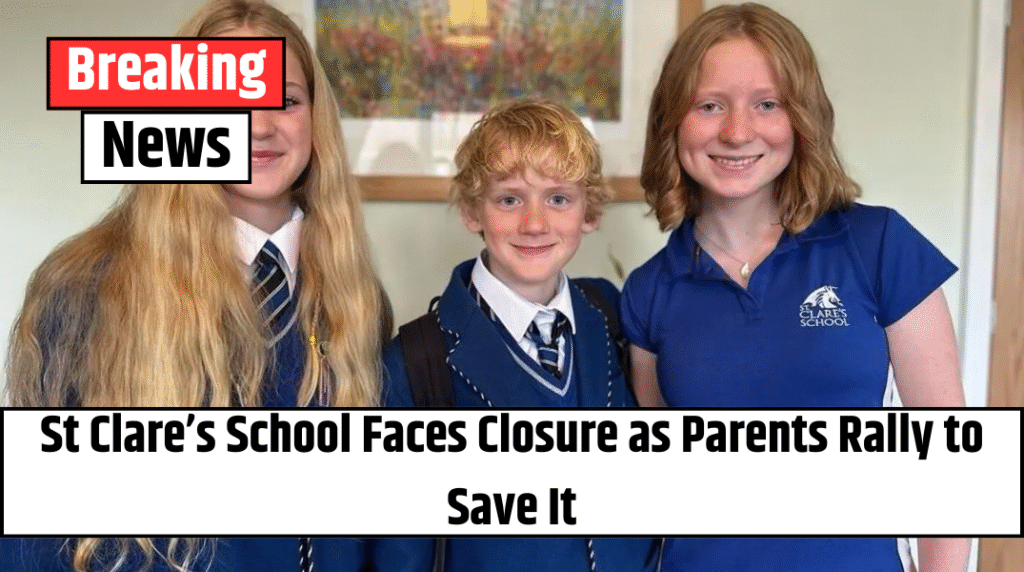Parents across the UK with children enrolled in independent schools are facing growing uncertainty as the wave of private school closures shows no signs of slowing. A potent mix of rising operational costs, declining student numbers, and the government’s introduction of VAT on school fees has put immense pressure on institutions long seen as community cornerstones.
One of the latest casualties in this growing crisis is St Clare’s School in Porthcawl, South Wales. The planned closure of the all-through independent school has sent shockwaves through the community, igniting an emotional response from families and launching an impassioned campaign to save it.
A Tight-Knit School Under Threat
St Clare’s, known for its small size and close-knit environment, serves students from early years through to sixth form. For many families, the school is more than just a place of learning—it’s a second home. The announcement by school operator Cognita that the institution would close sparked heartbreak and anger, especially among parents with children in critical exam years.
“We’re devastated,” one parent shared. “Our children are right in the middle of their GCSEs and A Levels. The disruption this causes is immense—not just academically, but emotionally too.”
Also Read – How Hot Is Too Hot? When Schools May Close Due to Extreme Heat
Parents Rally with a Rescue Plan
In a matter of weeks, the school’s parent community mobilized, raising over £1.3 million and submitting a detailed proposal to take over operations via a charitable trust. Their goal: to keep the school running through the exam period and possibly beyond.
The Save St Clare’s campaign has attracted widespread attention, including a dedicated website and local media coverage. Campaigners argue that the school is viable with appropriate restructuring and community-led oversight.
Cognita’s Response: Financial Realities Prevail
Despite the remarkable fundraising effort, Cognita remains unmoved. The global education group, which operates dozens of schools in the UK and overseas, maintains that falling enrolment has made the school unsustainable. In a statement, Cognita emphasized that the decision to close St Clare’s was taken only after a comprehensive review.
“We’ve spent significant time assessing all potential alternatives, including those submitted by parents,” a spokesperson said. “Unfortunately, none of the proposals offered a financially viable solution to the challenges facing the school.”
To help ease the transition, Cognita has agreed to waive Autumn Term tuition for current pupils and provide financial support for alternative education, including private tuition and online learning.
The Bigger Picture: Independent Schools in Crisis
St Clare’s isn’t alone. So far in 2025, over 20 independent schools across the UK have announced closures or confirmed they will cease operations, many directly citing the financial impact of VAT on fees. The new tax, paired with falling birth rates and regional demographic shifts, has created a perfect storm for small private institutions.
According to official data, enrolment in UK private schools dropped by nearly 2% between January 2024 and January 2025. Analysts predict the VAT policy could force as many as 37,000 students out of the independent sector over the next few years, potentially triggering the closure of 100 or more schools.
Smaller prep schools, single-sex schools, and boarding schools outside the South East are particularly at risk.
Also Read – Council Grants Announced to Support Local Schools and Community Groups
A Symbolic Battle with Wider Implications
While the fight to save St Clare’s may not succeed, it symbolizes a broader struggle playing out across the country. The outcome could influence how similar battles unfold in the months ahead, especially as other parent-led groups begin to mobilize in response to closures.
Still, there are questions about Cognita’s long-term intentions. Some insiders suggest the group may be preparing for a sale and is streamlining its portfolio. If true, it would mean that difficult decisions—like closing St Clare’s—are unlikely to be reversed unless a compelling business case emerges.
What’s Next?
The consultation period is ongoing, but many parents fear the decision is final. Whether or not St Clare’s survives, the situation highlights the fragile state of independent schooling in the UK, where a single policy shift can push even long-established institutions toward closure.
For now, the parents and staff of St Clare’s remain hopeful that their efforts may yet persuade Cognita to reconsider—or at least inspire other communities to fight for their schools while they still can.



